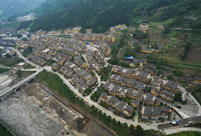 First overseas "China-standard" electric railway laid
First overseas "China-standard" electric railway laid
 College graduate launches organic agricultural cooperative in hometown
College graduate launches organic agricultural cooperative in hometown Guizhou Earthquake Emergency Rescue Team takes part in emergency exercises
Guizhou Earthquake Emergency Rescue Team takes part in emergency exercises Giant Spider-Man appears in Fuzhou
Giant Spider-Man appears in Fuzhou
 Beautiful Chinese-built roads in Africa
Beautiful Chinese-built roads in Africa Sagya Monastery in Tibet
Sagya Monastery in Tibet
 Young Chinese drive consumption
Young Chinese drive consumption
 The life of a model: Not as glamorous as it seems
The life of a model: Not as glamorous as it seems
 Hello Kitty, happy 40th birthday!
Hello Kitty, happy 40th birthday!
 The Western Qing Mausoleum
The Western Qing Mausoleum
BEIJING, May 16 (Xinhua) -- China on Friday once again urged Vietnam to immediately stop disruptions of Chinese company's drilling operation in the South China sea.
China has repeatedly urged Vietnam to respect China's sovereignty, sovereign rights and jurisdiction, stop its disruptive activities and pull all vessels and personnel out of the area, said senior diplomat Ouyang Yujing at a press briefing on Vietnam's disruption of Chinese company's drilling operation in the south waters to the Zhongjian Island of China's Xisha Islands.
However, the Vietnamese vessels continued to ram the Chinese vessels on the site, said Ouyang, director-general of the Department of Boundary and Ocean Affairs of China's Foreign Ministry.
Up to Friday morning, there have been as many as over 60 Vietnamese vessels of various types at the scene, he said, adding that Vietnamese collisions against Chinese vessels have totaled over 500 times since May 2.
China has lodged representations with the Vietnamese side for many times, urging the Vietnamese side to immediately stop disruptions and pull all vessels and personnel out of the area, said Ouyang.
Stressing that Xisha Islands are China's inherent territory, Ouyang said the waters where Chinese company operates is close to China's Xisha Islands, being only 17 nautical miles away from China's Zhongjian Island and nearly 150 nautical miles away from the coast of Vietnam.
"It makes no sense at all for the Vietnamese side to disrupt Chinese company's legitimate and legal drilling operation in China's coastal waters," Ouyang said.
According to Ouyang, China's operation does not begin this year or this month. Chinese company has been operating in this waters back to 10 years ago. From last May to June, Chinese companies also carried out 3-D seismic operations and drilling field investigation, doing necessary preparations for the drilling operation.
This drilling operation is a regular continuation to relevant work starting 10 years ago, he said.
Over the years, Vietnam has continued its oil and gas exploration and development activities in the disputed waters with China in the South China Sea, said Ouyang.
It is estimated that Vietnam has designated 57 oil and gas blocs in the disputed waters, including seven oil and gas fields in production and 37 drilling platforms, he said.
Taking into consideration the overall bilateral relations and peace and stability in the South China Sea, China has exercised great restraint towards Vietnam's actions, Ouyang said.
It is not surprising nor helpful to maritime stability and order that the Vietnamese side dispatched over 60 vessels including military vessels and marched for as far as 150 nautical miles to China's coastal waters to forcefully disrupt Chinese company's normal operation, he said.
The Vietnamese side repeatedly underlined the importance of respecting international law and international norms, said Ouyang.
The fact is that both China and Vietnam have ratified and joined the Convention for the Suppression of Unlawful Acts Against the Safety of Maritime Navigation and the Protocol for the Suppression of Unlawful Acts Against the Safety of Fixed Platforms Located on the Continental Shelf signed in 1988, but the Vietnamese side deployed a large number of vessels, including armed vessels to forcefully disrupt and obstruct China's operations, and rammed Chinese government vessels on escort and security missions in waters under China's jurisdiction, according to Ouyang.
They also cast fishing nets, logs and other large obstacles on the sea, he added.
All these have gravely violated international law, including the UN Charter, the UN Convention on the Law of the Sea and the Protocol for the Suppression of Unlawful Acts against the Safety of Maritime Navigation, disturbing freedom and security of navigation in these waters, said the senior diplomat.
"The current maritime situation is caused completely by Vietnam's illegal disruption of the normal operation by a Chinese company," said Ouyang.
Despite all this, China has kept in mind the larger interest of bilateral relations as well as peace and stability in the South China Sea, and will maintain communication with Vietnam, he said.
The two countries have smooth channels of communication, he said.
Up to now, the two sides have had over 20 diplomatic communications at various levels, including a phone call between Chinese State Councilor Yang Jiechi and Vietnamese Deputy Prime Minister and Foreign Minister Pham Binh Minh and a phone call between Chinese Foreign Minister Wang Yi and his counterpart Minh, said Ouyang.
"We believe that China and Vietnam have the ability to properly handle the current situation through joint efforts," he said.
 A bite of Jiang Nan
A bite of Jiang Nan PLA's tough exercises
PLA's tough exercises Best photos of the week
Best photos of the week  When we are young...
When we are young... Wedding photos of world champion
Wedding photos of world champion "The Most Beautiful Chinese Land"
"The Most Beautiful Chinese Land"  Men experience pains of childbirth on Mother's Day
Men experience pains of childbirth on Mother's Day  J-11 fighters training in complex meteorological conditions
J-11 fighters training in complex meteorological conditions Six years after Wenchuan earthquake
Six years after Wenchuan earthquake  8 great movies to watch with your mom
8 great movies to watch with your mom China's most luminous celebrities
China's most luminous celebrities Newly recruited police in Hetian hold drill
Newly recruited police in Hetian hold drill  Bird-men compete flying in Hong Kong
Bird-men compete flying in Hong Kong  The 'Chinese Dad'
The 'Chinese Dad' Shanghai locals bid farewell to childhood memories
Shanghai locals bid farewell to childhood memoriesDay|Week|Month